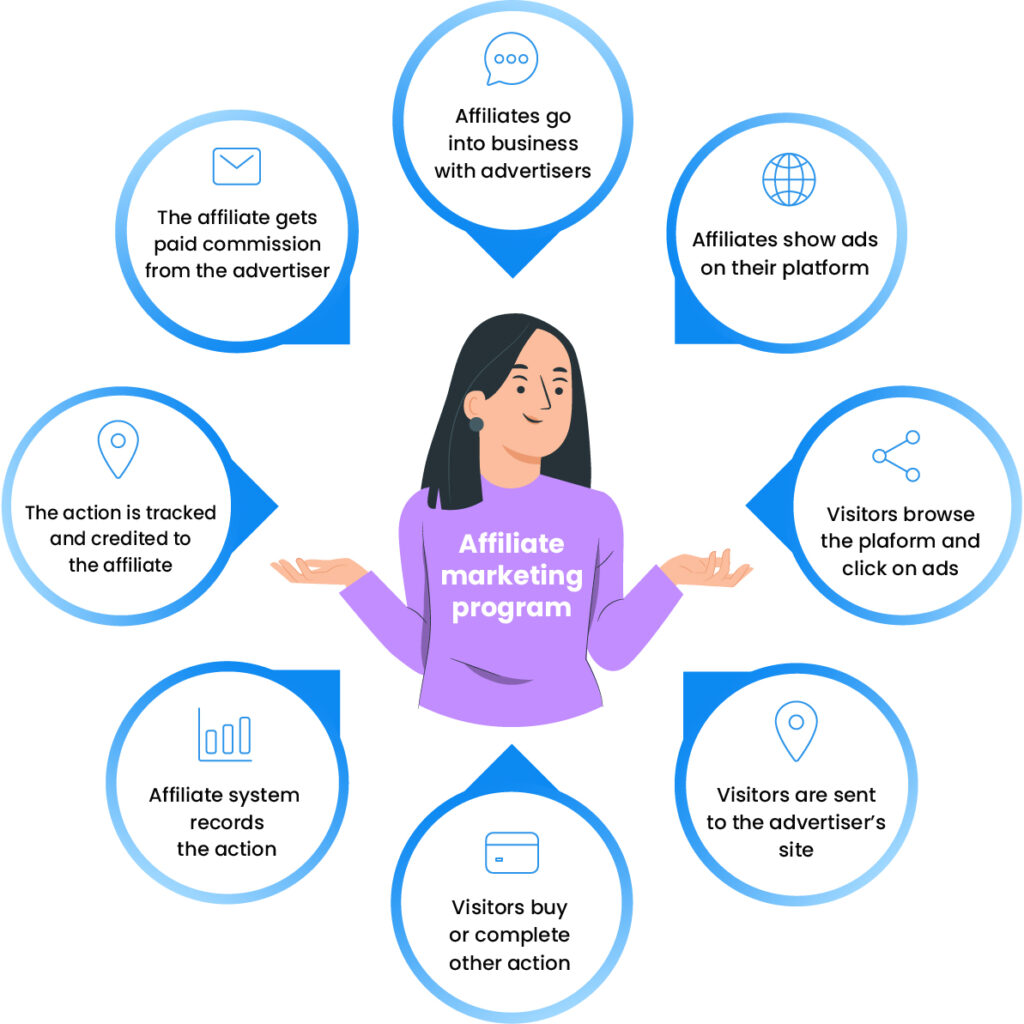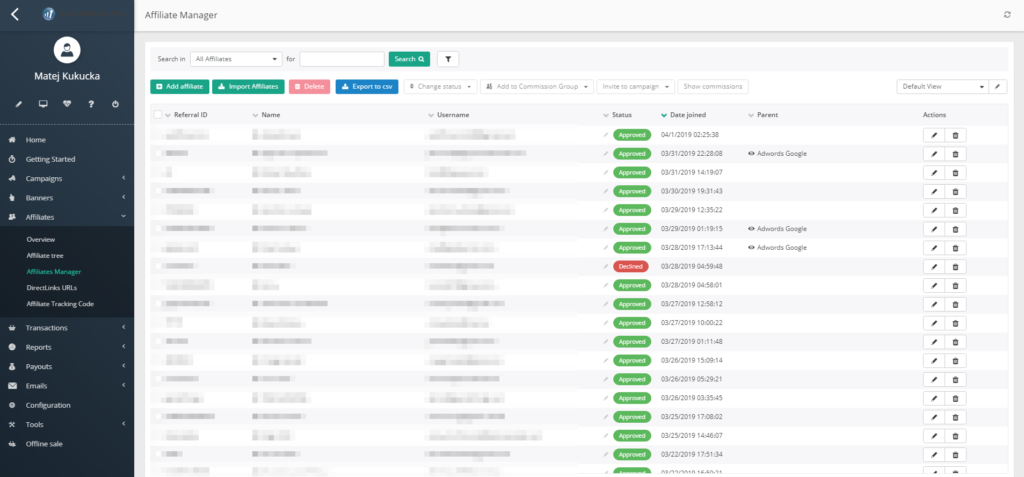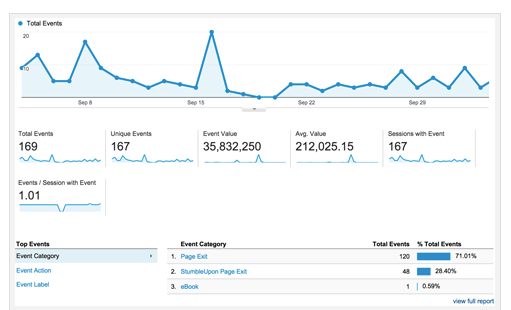Getting your affiliate programs to run smoothly without anyone being responsible for managing them is a tough task. But what exactly is affiliate management and should you hire a manager in your company? Read on to find out!
As of now, affiliate marketing is worth $12 billion. If you scroll down to the bottom of any SaaS website or click on a “User settings” icon, you are very likely to find either “Become an affiliate” or “Recommend us to your friends” links. Surprising? 80% of brands use affiliate marketing to generate leads, including some of the most well-known companies such as Amazon and Shopify.
And the number of companies that try to use affiliate marketing to their advantage is only growing since it’s a more-or-less a win-win strategy. Everyone can get something from this approach: companies boost their reputation and revenue at a very low cost (without the risks of having to pay in advance, like with other marketing strategies), and marketers get a reward for every customer they bring (so they have a vested interest in the success of the brand’s affiliate program).

The costs of running an affiliate program are minimal (apart from the commission for the marketer or a fee for the network owner), and even more importantly, you only pay for visible results. If no new customers are acquired, then you don’t have to pay a cent. The sales resulting from affiliate programs are tempting as well, as they can contribute up to 30% of a company’s total revenue. As such, various companies hire people as affiliate marketers, start their affiliate program, and let it run on auto-pilot…and then become disappointed when there are no tangible results.
Sadly, affiliate marketing isn’t just a “plug and play” venture, there are many tasks that have to be done daily to keep the program running smoothly. When you have only one or two affiliate marketers in your company, tracking and monitoring their performance isn’t a problem. But as the network grows, keeping track of everything starts to get problematic. The larger it becomes, the harder it is to manage everything by yourself. That’s when companies must begin to think about proper affiliate management and hiring a person for this sole purpose.
What is affiliate management?
Besides a great product, high-quality content, and skilled affiliates, you also need a management platform to grow your network and achieve the results you expect. Good management means keeping an eye on every aspect of the affiliate program, tracking and monitoring your affiliate’s performance, searching for new affiliates, optimizing your current strategy, as well as ensuring that all affiliates are paid on time.

Getting these things done at first is easy. But when you have a growing number of affiliates in your company, ensuring that everyone is on the same page (when they have never even met) and keeping the program running seamlessly becomes challenging. You need someone to lend you a hand – and by someone, I mean an affiliate manager.
What is an affiliate manager?
An affiliate manager is a person who is responsible for managing your affiliate program from A to Z. To mention just a few of their daily tasks, they’re usually responsible for tracking and monitoring all performance metrics, evaluating and optimizing the campaigns to produce better results, creating and implementing a strategy for the sale of the products, and offering suggestions on which keywords or content to use.
But that’s not all – a manager’s duties also include researching, recruiting, and training new affiliates. In addition to that, they have to build a strategy that aligns with the company’s goals, answer questions from the marketers, and resolve any issues that they may be having. Keeping an eye on the program’s terms and conditions and ensuring that breaches don’t happen is also a part of their job.
Last but not least, they have to create content for newsletters and resource guides, answer emails, and fulfill affiliate requests. As you can see, an affiliate manager’s job isn’t a piece of cake. To handle all of these tasks, an affiliate manager needs to have several skills.
What skills should an affiliate manager have?
Affiliate managers have to wear many different hats during the day (taking care of both the affiliate program and the people behind it). As such, they need a wide range of skills and qualities to succeed. Here are a few of the traits that you should look for in your future affiliate managers:
- Willingness to learn
With the number of companies that are starting their affiliate marketing campaigns, the market is getting more and more competitive over time. Unless the manager keeps an eye on the industry’s trends and discoveries, they will be quickly left behind. That’s why it’s incredibly important that managers spend time honing their skills and increasing their knowledge about the industry when it comes to new marketing channels, new tools, or new types of content. Increasing their experience will also make them more confident in their abilities and the suggestions they make, which will be crucial because…
- Confidence
…there isn’t a day that goes by when an affiliate manager doesn’t have to make decisions or discuss improvements and suggestions. They are also responsible for persuading affiliates to join the program or negotiating with suppliers. To stand their ground and convince companies that their tips and ideas are worthwhile, they need both data, public speaking skills, and a good deal of faith in their own abilities.
Affiliates also feel more at ease with a manager who knows what they’re talking about and can back up their suggestions with arguments – and that builds their confidence in the program as well.
- Flexibility
Marketing has always been the kind of industry in which something works today but is old news by tomorrow. But now, the situation can change in the blink of an eye (as the ongoing pandemic keeps showing us), so adapting to new situations quickly is becoming one of the most essential skills for affiliate managers. Even a meticulously planned campaign might be derailed because of an unexpected problem or a sudden change in the industry, and it’s the manager’s job to make swift decisions on how to face such situations. Managers also need to negotiate with their superiors, clients, or affiliates – which means they will often have to search for a compromise between their own and the clients’ or companies’ expectations.
Another role that is incredibly important in today’s industry is taking on new tasks and responsibilities in reaction to changing landscapes, and picking up new tools or marketing tactics rather than clinging to old methods. Managers need to monitor industry news and modify their approach when needed, like when a new marketing channel appears for example.
- Data analysis and computer skills
Affiliate marketing can be performed in an innumerable number of ways – but which one to pick? That answer is in the data marketers receive every day. Based on the data, managers can decide what actions give them the results they expect and which aren’t worth the time spent, which channels give them the best conversion rate, and how their actions impact the affiliate program as a whole.

But the total amount of data can be overwhelming – marketing managers should know which metrics they should focus on and which aren’t worth their time. But as tracking and analyzing the data manually can be both time consuming and confusing, affiliate managers should also be familiar with affiliate management tools, and know how to use them to track the performance of both the programs and the affiliates.
- Creativity
Selling a product or promoting a brand in an extremely competitive affiliate industry is much harder than people might think. That’s why coming up with fresh and innovative ideas for a campaign or brand promotion is necessary for managers. Turning unique ideas into reality allows companies to stand out from the crowd and attract both new affiliates and new customers – especially when a campaign becomes a viral hit.
Besides coming up with campaign ideas, managers also need a great deal of creativity to solve various business problems, handle unexpected turns of events, and find new “outside of the box” opportunities to promote their program.

- Communication and leadership skills
Managers have to talk with many people daily – from their affiliates to company owners, suppliers, and their customer base. As such, being an excellent public speaker is a must for marketers. When coming up with a new concept for a new campaign or marketing tactic, they will need to pitch their ideas and expectations to their clients and coworkers by presenting and discussing them during a meeting. As such meetings will surely involve plenty of questions, doubts, and possible criticisms. Managers must therefore be comfortable speaking in front of groups, answering questions, and handling negative opinions, while persuading others to follow the ideas or suggestions that are being presented.
Also, since affiliate managers are in charge of leading their teams, marketers must set goals, guide, and encourage their affiliates to achieve them, as well as present their ideas, expectations, and requests clearly.
- Organizational skills and steel nerves
With the number of tasks and responsibilities they have to handle every day, great organizational skills are a necessity for any manager. What’s more, affiliate managers have to make swift decisions regarding multiple projects (which usually have different requirements and are at different stages of development) or react to unexpected situations, so they also need to be able to keep a cool head.
Good organizational skills also help the manager create work schedules with a list of priorities, stick to deadlines, and keep an eye on the affiliates’ work.
Conclusion
Many people think that all they need to do is create affiliate programs, create links, and hire marketers, then they will be flooded with new customers, all for an incredibly low price. If only it were that easy!
To keep affiliate campaigns running smoothly, affiliate managers need to continuously improve and optimize. They will keep the program running without a hitch while also encouraging your affiliates to give their best and keep improving themselves. So why not start the coming new year with improved affiliate marketing?
Frequently Asked Questions
What is an affiliate management company?
An affiliate management company is a company that helps businesses manage their relationships with affiliate marketers. They provide services such as tracking affiliate activities, managing payments, and providing support to affiliates.
What is an affiliate management platform?
An affiliate management platform is a software or tool that helps businesses to manage their affiliate marketing programs. It provides features such as tracking affiliate sales, managing affiliate relationships, providing creatives and promotional materials, and analyzing the performance of affiliate marketing campaigns.
What is an affiliate management company?
An affiliate management company is a company that helps businesses manage their relationships with affiliate marketers. They provide services such as tracking affiliate activities, managing payments, and providing support to affiliates.
What is an affiliate management platform?
An affiliate management platform is a software or tool that helps businesses to manage their affiliate marketing programs. It provides features such as tracking affiliate sales, managing affiliate relationships, providing creatives and promotional materials, and analyzing the performance of affiliate marketing campaigns.
Share this article
Discover the essential role of affiliate software in managing and optimizing your affiliate marketing programs. Learn how it streamlines link tracking, referral management, and commission payments, ensuring data security and fraud prevention. Unlock growth opportunities with efficient program management and boost your business's reach and ROI. Visit now to explore the benefits of investing in affiliate software!
9 affiliate marketing tools that’ll help you run your affiliate program
Discover 9 essential tools to supercharge your affiliate marketing program! From visual content creation with Visme to comprehensive management with Post Affiliate Pro and audience insights via Smartlook, these tools will boost your sales and refine your strategy. Dive in to maximize your affiliate success!
How to keep your affiliates happy with split commissions
Discover how Post Affiliate Pro's SplitCommission™ feature can boost affiliate motivation and engagement by fairly distributing commissions among all contributors to a sale. Learn how to implement this innovative model to enhance your affiliate program's success.
6 reasons to use a third-party affiliate management system
Discover the top 6 reasons to invest in a third-party affiliate management system. Simplify your affiliate marketing with automated tracking, fraud detection, and user-friendly solutions that save time and reduce costs. Boost your business's efficiency and gain more control over your affiliate programs today.
How to choose affiliate software
Discover how to choose the best affiliate software with Post Affiliate Pro's comprehensive guide. Learn about essential features like tracking, fraud prevention, and customizable commission types, all designed to optimize your affiliate programs. Ensure seamless operations with easy setup, mobile access, and outstanding support to save time and build trust with affiliates. Visit our guide to make informed decisions and boost your affiliate marketing success!












